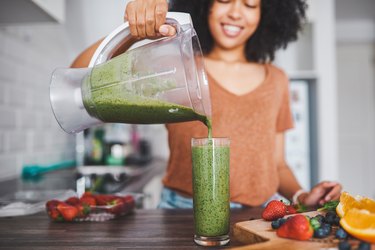
Some of the things you do every day to take care of your body may actually be detrimental to your dental health. But with a few small tweaks, you'll be on your way to super strong teeth. (No cavities here!)
Here are seven habits to watch out for:
Video of the Day
Video of the Day
1. Drinking Lemon Water
One popular hack for hydration: Add fruit. And many of us will often toss in a few lemon slices to add a refreshing spa vibe to our H2O.
The problem is, lemon is acidic. An acidic environment in your mouth breaks down enamel and mixes with bacteria to promote decay, Michelle McGregor, RDH, MEd, associate professor and Dental Hygiene Program director at Virginia Commonwealth University School of Dentistry in Richmond, tells LIVESTRONG.com.
Fix it: If you like lemon water, stick with one glass a day, an amount that is unlikely to harm teeth, McGregor says. Otherwise, use a larger glass for your lemon water, because more water will dilute the drink to make it less acidic. Drink it through a straw and rinse your mouth with plain water after you finish the glass.
2. Sipping Seltzer
Seltzer is another go-to for staying hydrated, and with zero calories, it's a great alternative to soda.
But the carbonation in flavored waters or seltzers makes the drink slightly more acidic than plain water, which spells trouble for your teeth — especially if you drink multiple a day (which many people do). Adding flavors — even if there is no added sugar or artificial sweeteners — make the drink even more acidic, McGregor says.
Fix it: When it comes to your teeth, plain seltzer is better than flavored. No matter which one you choose, drink it through a straw. And sip on seltzer with a meal, because the act of eating food will generate saliva, something that naturally rinses out your mouth, McGregor says. Aim to finish sipping once you’re done eating — taking a long time to consume a can extends exposure to your enamel.
3. Getting a Daily Juice Fix
Many of us struggle to get the recommended amount of fruit and veggies each day, so juicing might seem like an easy way to add in a serving or two.
But green juice, beet juice, carrot juice — any fresh fruit or veggie juice is really high in sugar, which doesn't do your chompers any favors. In fact: "Fruit juice is worse than lemon water and seltzers for your teeth," McGregor says.
Fix it: “It’s so much better to eat the whole fruit,” McGregor says. For one, you’re chewing on something, which is good for your teeth, and that also stimulates saliva production.
4. Grazing During the Day
Trying tiny meals throughout the day ? Your dentist would rather you eat three squares.
Eating creates an acidic environment in your mouth and that happens every time you eat, McGregor says. So, the more often you have a meal or snack, the more often teeth are exposed to that acidic environment and the less time your mouth stays in neutral pH.
What's more, there are certain types of foods — like carbohydrates, nuts and chips — that tend to stick in the crevices of your teeth and break down into sugar in your mouth.
Fix it: If you find that small meals work better for your lifestyle, then snack well. “Eat things like apples and carrots, crunchy foods that help the self-cleansing mechanisms on the teeth,” McGregor says.
Dairy, like yogurt, also won’t stick into teeth, and these foods also contain calcium and phosphorous to strengthen your smile.
Rinse out your mouth with water after eating, or pop in a piece of sugarless gum that contains xylitol, a sugar alcohol that has been shown to reduce decay, she says.
5. Scrubbing Teeth Too Hard
Hard-bristled brushes are abrasive to teeth and gums. "People ask why brands make medium and hard-bristled brushes, and it's because people still buy them," McGregor says. (This also goes for newer charcoal toothbrushes — and toothpaste for that matter — which is also abrasive.)
Over-scrubbing is also unnecessary. "Light brushing pressure removes the sticky residue on teeth. Once it hardens into calculus, only a dental professional can remove it during an office visit," she says.
Fix it: Use a soft-bristled brush and brush (using only light pressure) for two full minutes, spending 30 seconds in each of the four quadrants of your mouth.
6. Brushing After Eating Acidic Foods
Sipping on lemon water? Brushing after can cause problems.
"It's a misnomer that if you eat or drink something acidic, you should brush right away. The acid softens enamel a bit, so brushing immediately after can make damage worse," McGregor says.
Fix it: Rinse your mouth after eating or drinking acidic foods. Generally, it takes 20 minutes after eating for the pH in your mouth to naturally go back down to neutral. Then, go ahead and brush.
7. Avoiding Tap Water
Tap water contains fluoride, and if you live in an area with safe drinking water, then filling up from the tap will help protect your teeth from cavities.
"Fluoridated water is still considered to be one of the greatest public health initiatives we've ever had because of the amount of decay it reduced," McGregor says.
Topical application (like in fluoridated toothpaste) is great, but a big benefit comes from ingesting fluoride, she says.
Fix it: If you’re OK with the taste of the tap but still prefer filtered, try to fill up one glass of water from the sink.
Is this an emergency? If you are experiencing serious medical symptoms, please see the National Library of Medicine’s list of signs you need emergency medical attention or call 911.